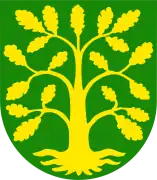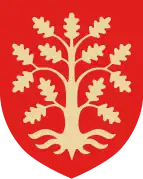Vest-Agder
Vest-Agder (Norwegian: [ˈvɛ̂stˌɑɡdər] ⓘ; "West Agder") was one of 18 counties (fylker) in Norway up until 1 January 2020, when it was merged with Aust-Agder to form Agder county. In 2016, there were 182,701 inhabitants, around 3.5% of the total population of Norway. Its area was about 7,277 square kilometres (2,810 sq mi). The county administration was located in its largest city, Kristiansand.
Vest-Agder fylke | |
|---|---|
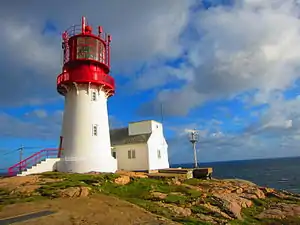 Lindesnes Lighthouse in September 2011 | |
 Flag 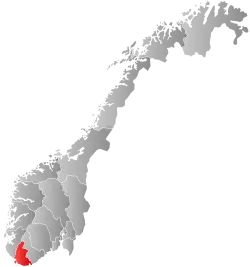 Vest-Agder within Norway | |
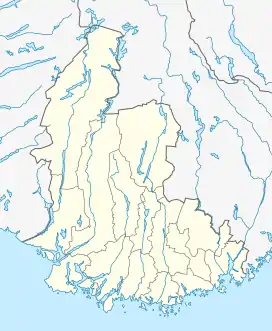 Vest-Agder fylke Vest-Agder within Vest-Agder 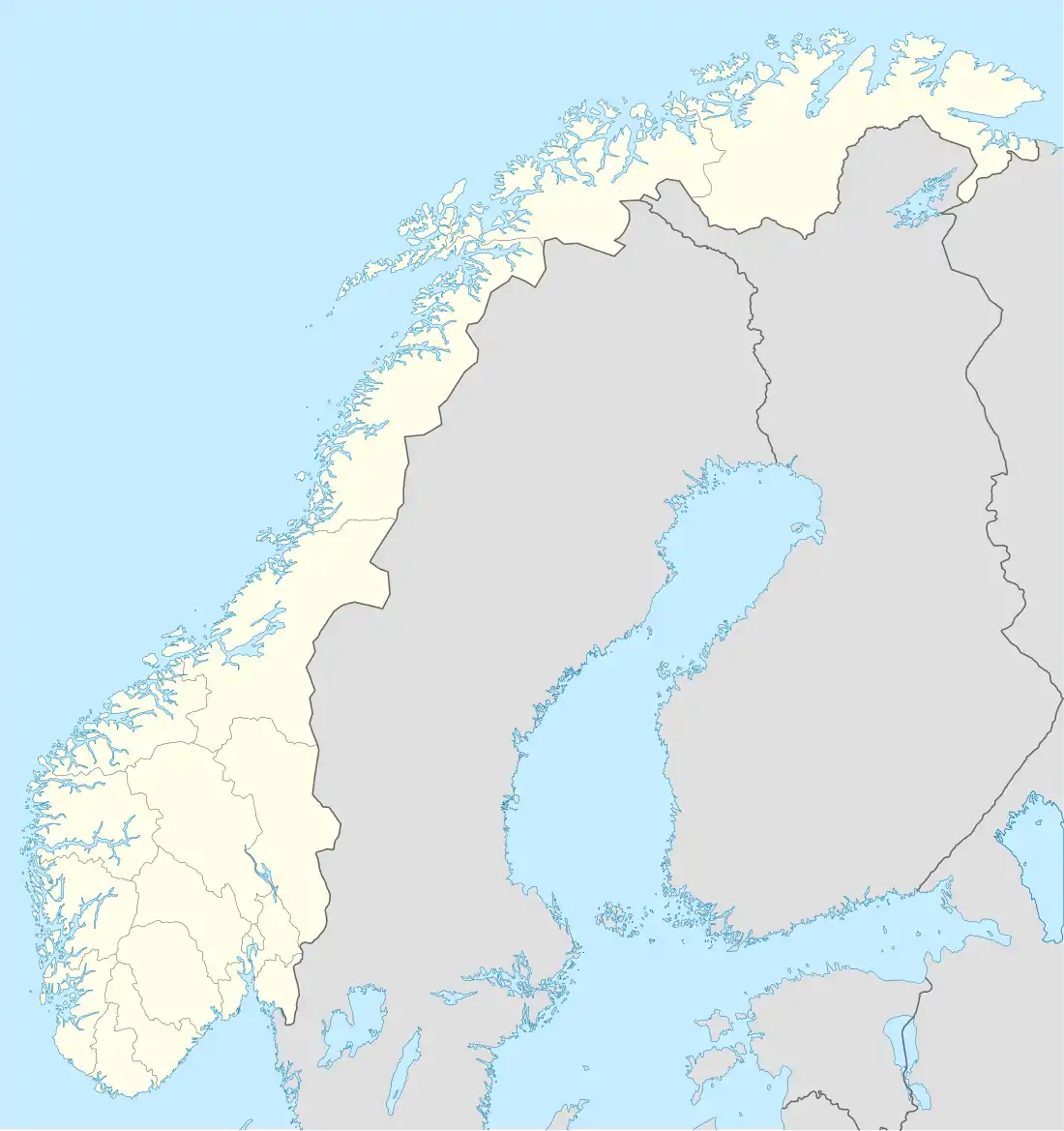 Vest-Agder fylke Vest-Agder fylke (Norway) | |
| Coordinates: 58.5°N 07.1°E | |
| Country | Norway |
| County | Vest-Agder |
| District | Southern Norway |
| Established | 1685 |
| • Preceded by | Agdesiden |
| Disestablished | 1 Jan 2020 |
| • Succeeded by | Agder county |
| Administrative centre | Kristiansand |
| Government | |
| • Body | Vest-Agder County Municipality |
| • Governor (2016-2019) | Stein Arve Ytterdahl |
| • County mayor (2011-2019) | Terje Damman (H) |
| Area (upon dissolution) | |
| • Total | 7,276.53 km2 (2,809.48 sq mi) |
| • Land | 6,678.89 km2 (2,578.73 sq mi) |
| • Water | 597.64 km2 (230.75 sq mi) |
| Population (30 September 2019) | |
| • Total | 188,722 |
| • Density | 27.4/km2 (71/sq mi) |
| • Change (10 years) | |
| Demonym | Vestegde[1] |
| Official language | |
| • Norwegian form | Neutral |
| Time zone | UTC+01:00 (CET) |
| • Summer (DST) | UTC+02:00 (CEST) |
| ISO 3166 code | NO-10 |
| Income (per capita) | 137,000 kr (2001) |
| GDP (per capita) | 219,928 kr (2001) |
| GDP national rank | #14 in Norway (2.27% of country) |
Vest-Agder was a major source of timber for Dutch and later English shipping from the 16th century onwards. Historically, the area exported timber, wooden products, salmon, herring, ships, and later nickel, paper, and ferrous and silica alloys. Compared to other counties of Norway, today's exports-intensive industry produces shipping and offshore equipment (National Oilwell Varco), cranes (Cargotec), ships (Umoe Mandal, Flekkefjord Slip), wind turbine equipment, nickel (Glencore), and solar industry microsilica (Elkem). A major tourist attraction is Kristiansand Dyrepark.
Vest-Agder grew to political prominence with the decision of King Christian IV to establish Kristiansand as a key naval base, trading centre, and bishopric in 1641, forcing urban citizens and merchants from all over Agder to settle in the city. The county had large-scale emigration to North America from the 1850s onwards.
General information
Geography
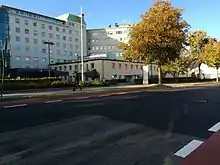
Vest-Agder is the western and southernmost part of the current county of Agder, extending inland from the North Sea and its arm, the Skagerrak, to the southern fringes of Setesdalen, surrounded by the mountain range Setesdalsheiene. It includes the southernmost point of the entire country, Pysen island south of Mandal, and the southernmost part of continental Norway, Lindesnes. It has a very broken and hilly surface. From the coast there are six valleys that stretch north into the county: Audnedalen, Lyngdalen, Kvinesdalen, Mandalen, Sirdalen, and Otradalen (which continues into Aust-Agder where it is called Setesdalen).
Most of the habitation lies along the coast, including the towns Kristiansand, Mandal, Flekkefjord, and Farsund. About 31 fjords are located there. The northern portion is mountainous and sparsely settled, while the central upland moors are used for pasturing of cattle and sheep. Since the Gulf Stream touches the coast of Vest-Agder, it is also called "the Norwegian Riviera", and Agder as a whole is also called "The California of Norway".
History
| Year | Pop. | ±% |
|---|---|---|
| 1951 | 96,942 | — |
| 1961 | 109,083 | +12.5% |
| 1971 | 124,171 | +13.8% |
| 1981 | 136,718 | +10.1% |
| 1991 | 145,091 | +6.1% |
| 2001 | 156,878 | +8.1% |
| 2011 | 172,408 | +9.9% |
| Source: Statistics Norway.[4] | ||
The oldest ever remains of an 8,000+ year old human in Norway has been found at Søgne, she endured an almost exclusively marine diet. In Kristiansand, a Sarup-style Neolithic funeral site from 3,400 BC has been excavated. Just before and after the onset of the common era, the region was uniquely rich in sites dedicated to the God Ull (Ullr), and also had a semi-urban settlement at Oddernes (Kristiansand). Norway's first possible all-national king, Halvdan Svarte, was raised probably in the Kvinesdal valley at a matrimonial manor, his mother was presumably the daughter of King Harald of Agder. He was followed by his son King Harald Fairhair, who had his easternmost manor at Kongsgård near Kristiansand. Churches are known since Viking ages. Vest-Agder was not particularly preeminent in the later Viking and Medieval Ages. Mandal (Vesterrisør) and Kristiansand (Ottrunes) had semi-urban trading centers from the 1300s onwards, but did not enjoy urban economic privileges until the 1632 (Mandal) and 1641 (Kristiansand). A general lack of agricultural fertility made the region remaining a relatively poor part of Norway through the centuries.
In the 16th century, Dutch merchant vessels began to visit ports in southern Norway to purchase salmon and other goods. Soon thereafter the export of timber began, as oak from southern Norway was exceptionally well suited for shipbuilding. As the Netherlands developed in the 17th century, it began to suffer from a severe labor shortage, and many families from Vest-Agder and Aust-Agder emigrated to the Netherlands, especially the coastal areas.
In the 19th century, emigration to the United States started. One of the most important causes of this emigration was the emergence of steamships. While Vest-Agder and Aust-Agder historically had very strong positions in the manufacture and repair of sailing ships, the shift to steamships was poorly utilised and resulted in a cyclical slope for the shipbuilding and shipping industries. Emigration to the United States was a means of escaping from the high unemployment that followed.[7] Many Americans returning to the county after Norway became prosperous. This feature is particularly predominant in Kvinesdal and Farsund in the west, which maintains strong cultural links with the United States.
During World War II the area had substantial fortifications and German personnel, with major bases and airfields in Lista, Mandal and Kristiansand. Batterie Vara near Kristiansand was constructed as one out of two 40 cm coastal artillery forts covering the Skagerrak Sea in conjunction with a similar fort in northern Denmark. After the war, Kristiansand grew considerably whereas other cities lost much of their relative economic and demographic importance.
Municipalities
On 1 January 1838, all the counties were divided into local administrative units each with their own governments (see formannskapsdistrikt). The number and borders of these municipalities were based on the parishes of the Church of Norway. Over time the number and locations of these have changed, and at present there are 15 municipalities in Vest-Agder. The municipality of Åseral was part of the neighboring county of Nedenes until 1880, when it was moved to Vest-Agder.[8]
Municipalities before 2020
|
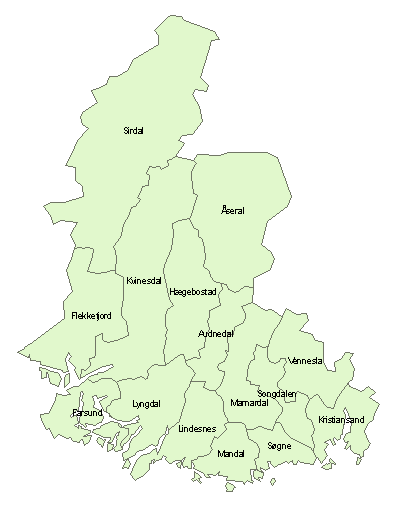 Municipalities in Vest-Agder before 2020.
|
Parishes
- Austad
- Bakke
- Bjelland
- Eiken (Egen)
- Farsund
- Feda
- Finsland
- Fjotland
- Flekkefjord
- Flekkerøy
- Frelseren
- Greipstad
- Grim
- Grindheim (Grindum)
- Gyland
- Halse (Halsaa)
- Harkmark
- Haughom
- Hellemyr
- Herad (Herred)
- Hidra (Hitterø)
- Holum (Holme)
- Hægebostad (Øvre Kvinesdal)
- Hægeland (Heggeland)
- Hånes
- Justvik
- Konsmo
- Korshamn
- Kristiansand
- Kristiansand tukthus
- Kvinesdal
- Kvævemoen
- Kvås (Qvås)
- Laudal
- Liknes, see Kvinesdal
- Lista (Vanse)
- Ljosland
- Lund
- Lunde
- Lyngdal
- Mandal
- Nes
- Nord-Audnedal
- Netlandsnes
- Oddernes
- Randesund
- Sirdal
- Spangereid
- Spind
- Søgne
- Old Søgne
- Søm
- Sør-Audnedal
- Tonstad
- Torridal
- Tveit
- Valle
- Vanse
- Vennesla
- Vestbygda
- Vigmostad
- Voie
- Vågsbygd
- Øvrebø
- Øvre Sirdal
- Øyslebø
- Åknes
- Åseral
- Flekkefjord Branch (LDS, 1899–1904)
- Kristiansand Branch (LDS, 1856–1912)
- Kristiansand (Katolske Apostoliske, 1896–1925)
Villages
- Alleen
- Andabeløy
- Aukland
- Austad
- Ausvika
- Birkeland
- Bjelland
- Bjørnestad
- Breland
- Brennåsen
- Eik
- Eiken
- Eikerapen
- Feda
- Finsland
- Fjotland
- Fleseland
- Grindheim
- Grovane
- Gyland
- Haddeland
- Harkmark
- Heddeland
- Homstean
- Hægeland
- Hæåk
- Høllen
- Høllen
- Hånes
- Ime
- Justvik (Gjusvik)
- Kilen
- Kirkehavn
- Knaben
- Koland
- Konsmo
- Korshamn
- Krossen
- Kvås
- Kyrkjebygda
- Langenes
- Laudal
- Liknes
- Ljosland
- Lohne
- Loshavn
- Lunde, Sirdal
- Lunde
- Mosby
- Mushom
- Nodeland
- Nodelandsheia
- Ny-Hellesund
- Ore
- Randesund
- Rasvåg
- Røyknes
- Sande
- Skarpengland
- Skofteland
- Skomrak
- Sira
- Sirnes
- Skålevik
- Snartemo
- Storekvina
- Strai
- Svenevig
- Svenevik
- Tangvall
- Tingvatn
- Tonstad
- Trysnes
- Tveit
- Vanse
- Ve
- Vedderheia
- Vennesla
- Vestbygd
- Vigeland
- Vigmostad
- Volleberg
- Øvre Eikeland
- Øvrebø
- Øyslebø
- Åknes
- Ålefjær
- Ålo
- Åna-Sira
- Åros
- Åvik
Former Municipalities
- Austad
- Bakke
- Bjelland
- Bjelland og Grindum
- Eiken
- Feda
- Finsland
- Fjotland
- Greipstad
- Grindheim
- Gyland
- Halse og Harkmark
- Herad
- Hidra
- Holum
- Hægeland
- Konsmo
- Kvås
- Laudal
- Lista
- Nes
- Nes og Hitterø
- Nord-Audnedal
- Oddernes
- Randesund
- Spangereid
- Spind
- Sør-Audnedal
- Tonstad
- Tveit
- Undal
- Vigmostad
- Øvre Sirdal
- Øvrebø
- Øvrebø og Hægeland
- Øyslebø
- Øyslebø og Laudal
Notable residents
Category:People from Vest-Agder
- Sofus Arctander (1845-1924), Liberal politician, Prime Minister for a brief period in 1905.
- Bernt Balchen (1899-1973), aeronaut, WWII pilot, polar navigator, military officer.
- Jens Bjørneboe (1920-1976), author and playwright.
- Camilla Collett (Wergeland) (1813-1895), author, writer, feminist, emancipator.
- Bjøro Håland, country & western musician.
- Bjarne Lingås (1933-2011), heavyweight boxer, amateur (198, 14 losses) and professional (14, 2 losses).
- Rolf Løvland, musician, composer, director, twice winning European Song Contest.
- Herman Wedel Major (1814-1854, born in Ireland), regarded as the founder of modern psychiatry in Norway.
- Svein Mathisen (1952-2011), football player for IK Start, Hibernian, and Norway.
- Mette-Marit, Crown Princess of Norway (1973-), Crown Princess of Norway.
- Jørgen Moe (1813-1882), writer, folklorist (Asbjørnsen og Moe), poet, bishop of Kristiansand.
- Nicolai Tangen (1966), hedgefund investor, CEO of the Norwegian Soveregin Wealth Fund (NBIM) since 2020.
- Christian Rynning-Tønnesen (1959-), business leader, CEO of Norske Skog, Statkraft.
- Emanuel Vigeland (1875-1948), artist, sculptor, painter, creator of Vigeland Park in Oslo.
- Gustav Vigeland (1869-1945), artist, sculptor, painter.
- Henrik Wergeland (1808-1845), author, writer, playwright, educator, national archivar, bureaucrat, emancipator.
References
- "Navn på steder og personer: Innbyggjarnamn" (in Norwegian). Språkrådet.
- "Forskrift om målvedtak i kommunar og fylkeskommunar" (in Norwegian). Lovdata.no.
- "Kommunevåpen". Flags of the World. 28 June 2002. Archived from the original on 19 April 2008. Retrieved 28 September 2008.
- "Projected population - Statistics Norway". Archived from the original on 2012-05-26. Retrieved 2012-05-26.
- Statistics Norway - Church of Norway.
- Statistics Norway - Members of religious and life stance communities outside the Church of Norway, by religion/life stance. County. 2006-2010 Archived November 2, 2011, at the Wayback Machine
- Follesdal, John. "Vest-Agder genealogy resources". Ancestry.com. Retrieved 2009-12-15.
- Jukvam, Dag (1999). "Historisk oversikt over endringer i kommune- og fylkesinndelingen" (PDF) (in Norwegian). Statistisk sentralbyrå.
{{cite journal}}: Cite journal requires|journal=(help)
External links
 Media related to Vest-Agder at Wikimedia Commons
Media related to Vest-Agder at Wikimedia Commons Vest-Agder travel guide from Wikivoyage
Vest-Agder travel guide from Wikivoyage- Vest-Agder fylkeskommune (in Norwegian)
- Vest-Agder: Norway's southernmost county
